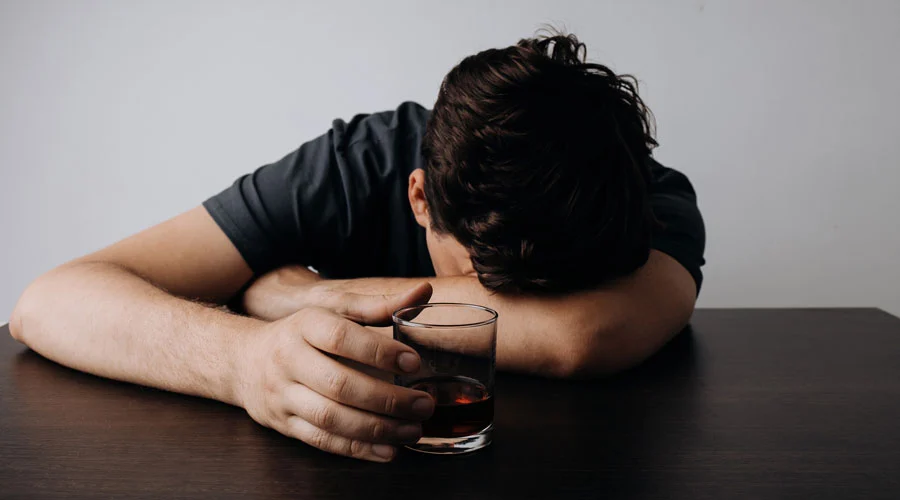3 Stages of Alcoholism
Know the Stages of Alcohol Use Disorders and How to Get Help
Table of Contents
Some describe alcoholism, or Alcohol Use Disorder (AUD), as being stuck on a Ferris Wheel that never stops for onboarding or off-boarding passengers. You endlessly ride the same loop, unable to break the repetitive cycle. Does that metaphor strike a chord with you?
If so, knowing the 3 stages of alcoholism can help you determine if you or a loved one is struggling with alcohol abuse or alcohol addiction.
Changes Healing Center in Phoenix, Arizona, knows that a drinking problem can go from recreational or casual to long-term alcohol abuse without the person even realizing that they’ve shifted gears. We are a Joint Commission-accredited treatment facility; our professional, caring, and compassionate staff members have helped numerous clients recover from every stage of alcoholism.
If you want to learn more about the intersection of substance abuse and the stages of alcohol addiction, keep reading. This article will answer your questions.
What Is the Difference Between Alcohol Abuse and Alcohol Addiction?
Although many refer to alcohol abuse and addiction interchangeably, the two things are not really the same. When you understand the key differences, you start to see the visible signs of emerging drinking problems.
It’s also important to note that alcohol can be deadly whether used casually or compulsively. The Centers for Disease Control (CDC) warns that alcohol causes about 488 preventable daily deaths in the United States. The CDC suggests connecting with a healthcare professional (like the well-qualified team at Changes Healing Center) or the Substance Abuse and Mental Health Services Administration National Helpline for help.
Alcohol Abuse: Problematic Alcohol Consumption
Alcohol abuse drinking habits may cause damage to the drinker’s health, cause relationship problems, or mean an inability to work. The person engages in risky behaviors, such as driving while impaired. They often drink socially or to relieve stress. They also drink to excess, with frequent hangovers and life disruptions.
However, their drinking habits have not completely seized control of their lives. They may not drink daily but engage in binge drinking on days off. They have not developed alcohol dependence and don’t have withdrawal symptoms, even after a round of excessive drinking.
Those who abuse alcohol will eventually develop greater alcohol tolerance; the person who started drinking alcoholic beverages to “party” can slip into full-blown alcohol addiction.
This spot marks the fine line between alcohol abuse and the first stage of alcoholism.
Noelle Recognized Her Abusive Relationship with Alcohol Before It Was Too Late
Take ‘Noelle,’ a young adult who started drinking heavily every weekend to overcome her inherent shyness. After a few drinks, she’d transform from the quiet girl in the corner to the “it girl;” she became the life of the party. How much she enjoyed all the attention! Noelle had a minor fender bender one night on her way home from her favorite club.
This incident was monetarily costly, but it was also the wake-up call Noelle had needed. She started going to SMART Recovery meetings and was able to realign her priorities and avoid slipping into alcoholism. Today, Noelle is a teacher and uses her influence to educate middle school children about the dangers of abusing substances.
Alcohol Addiction: Becoming Physically Dependent on Alcohol
On the other hand, alcohol addiction is a chronic disease or Alcohol Use Disorder. The person can’t stop drinking due to alcohol dependence. With addiction, the person makes alcohol use a central focus in life, usually leaving behind other things that used to bring them joy.
The drinking problem grows so bad that it might even replace a good job, family members, or friends. They might even have legal trouble or drink to the point of blackouts.
The person often notices that this is happening. But their body now craves alcohol and cannot function without it. Shortly after the last time drinking alcohol, their body begins to have cravings and starts to panic, causing withdrawal symptoms if the person does not drink.
With alcohol addiction, drinking gains complete control over the individual’s mind and body.
Kris Learned Help Was Available for Alcohol Addiction After Facing a Crisis
‘Kris’ grew up in a home that glamorized alcohol abuse; life in his family was just one big party. He even had an uncle who had died young from cirrhosis. Seeing adults around him drinking all the time meant that he learned to use alcohol as a coping tool.
By the time Kris was an adult, he’d had a drinking problem for almost ten years. He could not hold down a job for more than a few weeks. A night of binge drinking with his enabling friends brought Kris to the emergency room with alcohol poisoning. The E.D. physician realized that Kris was in end stage alcoholism at a shockingly young age – he was just 24.
The hospital social worker helped Kris sign up for Arizona Medicaid, making him eligible for alcohol addiction treatment at Changes Healing Center. After an emergency admission at Changes, we quickly determined that he drank to erase his traumatic childhood and the memory of almost non-existent parents.
With 30 days of inpatient treatment followed by regular AA meetings, Kris is now doing much better. He’s found a great job and is happy in his ongoing recovery.
Common Alcohol Withdrawal Symptoms

Do you think that you or a person you love is in a state of alcohol addiction? Watch for these mild to severe alcohol withdrawal symptoms:
- Anxiety or depression
- Mood swings
- Sweating
- Nausea or vomiting
- Headaches
- Sleep disruptions or insomnia
- Heart fluttering
- High blood pressure
- Confusion
- Delirium tremens
- Seizures
- Hallucinations
These common withdrawal symptoms demonstrate why it’s unsafe to quit drinking cold turkey. A medical detox for alcohol provides essential support from professionals who can administer relief if you experience withdrawal symptoms.
The 3 Stages of Alcoholism Require Professional Alcohol Addiction Treatment
If excessive drinking is disrupting your life, understanding these three stages of alcoholism can help you find the motivation for change. The brain changes with alcoholism, with the brain’s reward center savoring the relaxation effect and looking forward to the next drink (cravings).
If you’re reading this because someone you love might be drinking alcohol to excess, learning more about the cycle of alcoholism – from the first to the third stage – can help you support them and encourage them to seek addiction treatment from a professional treatment center like Changes.
Early Stage of Alcoholism: The First Stage of Alcoholism
The first stage of alcoholism, pre-alcoholism, happens when someone relies on alcohol for pleasurable feelings or to relieve stress or anxiety. It’s often a social activity or to fit in or form new personal relationships. Many binge drinkers fall into this category.
They don’t know why they feel compelled to start binge drinking after work every Friday, they see it as part of their routine, usually not recognizing the early stages of alcoholism.
Problem drinking during this early stage means forming an unhealthy relationship with alcohol and developing alcohol tolerance or needing to drink more or use other substances to enjoy the same feelings.
Early intervention is the key to breaking the cycle – and the time is right now. Outpatient treatment is often a good option at this point of the three stages of alcoholism, as long as no additional health problems have developed.
Middle Stage Alcoholism: The Second Stage of Alcoholism

The second stage of alcoholism, also called middle-stage alcoholism, brings the loss control over their binge drinking habits. They drink compulsively, often hiding the deterioration in their physical and mental health by isolating themselves.
They may experience blackouts or have memory loss about things that happened while drinking. When they drink alcohol, they often forget about other important commitments, such as children, careers, or family members.
Physically, they have developed even more tolerance. The above-mentioned alcohol withdrawal symptoms become apparent a few hours after they stop drinking.
End Stage Alcoholism: The Last Stage of Alcoholism
The third stage, end-stage alcoholism, is when mental and physical symptoms become too great to hide from others. The person continues to drink heavily, despite the severe health problems. They now have a weakened immune system and get sick easily.
They may also have the most severe symptoms of physical and mental health issues during the final stage of alcoholism:
- Fatty liver disease, where the liver cells are damaged, cirrhosis, or other liver problems
- Malnutrition or weight fluctuations
- Jaundiced skin or yellow eyes (a result of the liver damage)
- Poor hygiene or unkempt appearance
- Social isolation or depression
- Unexplainable mood swings
Alcohol use Disorder dominates the person’s life. If they have tried to quit, they may have had relapses due to severe withdrawal, including delirium tremens. when they try to stop drinking. End stage alcoholism is a serious wake-up call. They must change their drinking habits and quit drinking alcohol in this final stage. It can be a matter of life or death.
An inpatient recovery center that takes a holistic approach to healing late stage alcoholism can still help the person end their unhealthy drinking habits and commit to lifelong recovery.
Do You Drink Alcohol Compulsively? A Self-Assessment

Now that you know the three stages of alcoholism, you might wonder if your drinking habits are putting you at risk. Reflecting on this topic can be very uncomfortable. But be honest, as the reflection can help understand if you or a loved one is already in the three stages of alcoholism or is still abusing alcohol and on the brink.
On a final note, this self-assessment is not a diagnosis. However, if your results indicate a heightened risk, we ask that you share your score with your doctor or call Changes for additional guidance.
Connect With Changes for Help With Alcohol Use Disorder
If you are ready to break away from the endless loop of alcohol consumption, call us right away. It’s confidential to speak with us, and our admissions process is easy.
We are in-network with most major health insurance companies and Arizona Medicaid (AHCCCS). We’re here to help you with problem drinking or drug use, and any additional mental health concerns.
It’s time to let yourself off that endless Ferris wheel – call us today.
Why Changes Healing Center?
The mission of the CHC family is to assist in any way possible our client’s desire to achieve and maintain a life of long-term sobriety.
We are a licensed drug rehab in Phoenix, AZ, with substance abuse and Arizona alcohol rehab programs.
Our Programs serve Maricopa County and the surrounding cities and regions with evidence-based behavioral healthcare provided by individuals passionate about recovery.
We are JCAHO accredited for addiction treatment by the Joint Commission and strive to continuously improve our offerings and make treatment more accessible for all in need.

The information on this website should not be taken as medical advice for any individual case or situation. This information is not intended to create, and receipt or viewing does not constitute, a doctor-patient relationship. © 2023 All Rights Reserved.

